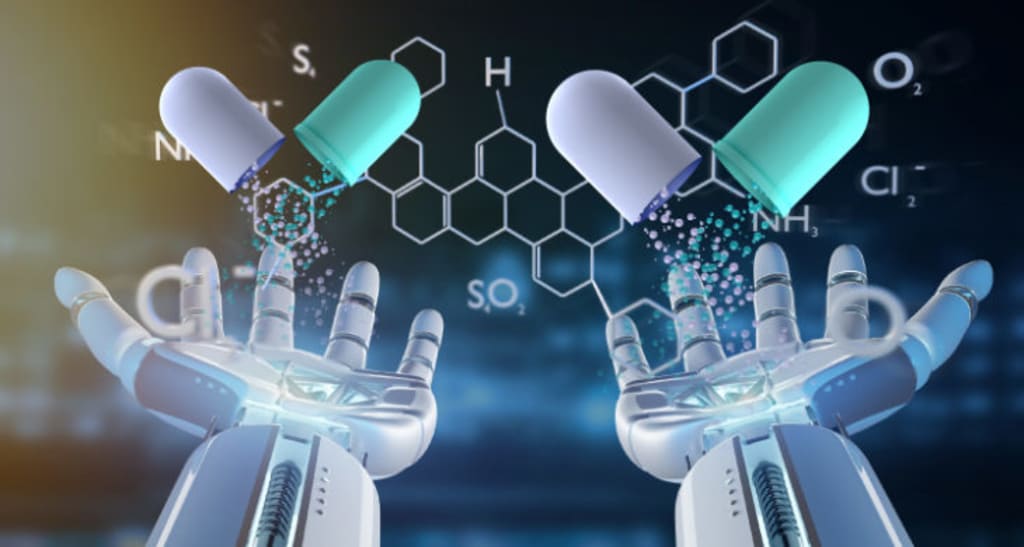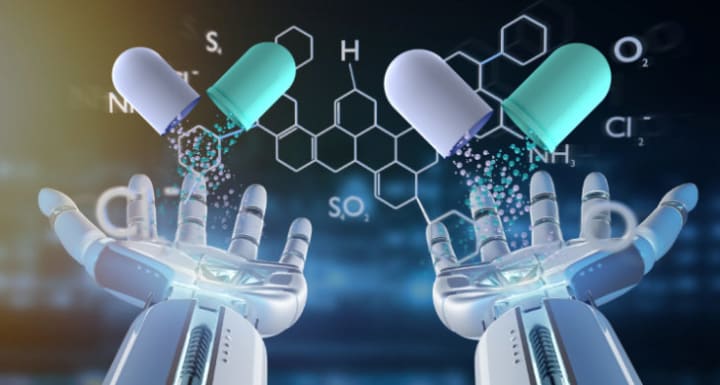AI Unearths a Hidden Gem: Abaucin, a Rare Antibiotic Revolutionizing the Fight Against Drug-Resistant Infections
Discovering Abaucin: The AI Breakthrough in Tackling Antibiotic Resistance and Transforming Medical Research

AI Finds Rare Antibiotic that Could Combat Drug-Resistant Infections
In a groundbreaking study conducted by researchers from the Massachusetts Institute of Technology (MIT) and McMaster University, a rare antibiotic with the potential to combat drug-resistant infections has been discovered using artificial intelligence (AI). This remarkable finding holds significant promise for addressing the growing concern of drug-resistant bacteria, which pose a serious threat to global health. In this article, we will explore the details of this study, including its methodology, implications, and the future of AI in antibiotic research.
Understanding Drug-Resistant Infections
Drug-resistant infections, also known as antibiotic-resistant infections, are caused by microorganisms, such as bacteria and viruses, that have developed resistance to the drugs used to treat them. The overuse and misuse of antibiotics have contributed to the emergence of these resistant strains, making them a major challenge in modern medicine. To combat this pressing issue, researchers are continually searching for new antibiotics that can effectively treat drug-resistant infections.
The Growing Need for New Antibiotics
With the rise of drug-resistant bacteria, there is an urgent need for the development of new antibiotics. Traditional methods of antibiotic discovery are often time-consuming and resource-intensive, leading researchers to explore innovative approaches. One such approach is leveraging AI technology to accelerate the identification of potential drug compounds.
Leveraging AI in Antibiotic Discovery
Artificial intelligence, particularly machine learning, has shown great promise in various fields, including healthcare and drug discovery. By training AI algorithms on vast datasets, researchers can effectively analyze and identify patterns within the data, leading to more efficient and targeted research efforts. In the case of antibiotic discovery, AI can significantly speed up the process of screening potential drug compounds, ultimately increasing the chances of finding novel antibiotics.
The MIT and McMaster University Study
In collaboration, researchers from MIT and McMaster University embarked on a study to identify a new antibiotic using AI. Their aim was to combat Acinetobacter baumannii, a bacteria species commonly found in hospitals, known to cause pneumonia, meningitis, and other severe infections. Additionally, this bacteria is responsible for a significant number of infections in wounded soldiers.
To identify potential drug compounds, the researchers utilized a vast catalogue of 7,000 compounds. They trained the AI algorithm to evaluate whether a chemical compound could inhibit the growth of A. baumannii. The study yielded a remarkable discovery, showcasing the power of AI in identifying novel antibiotics.
The Methodology of the Study
The research team employed a systematic approach in their study. Initially, they trained the AI algorithm using chemical structures that could inhibit the growth of E. coli, a well-studied bacteria species. The algorithm was then used to screen over 100 million compounds, resulting in the identification of a molecule called halicin. Halicin exhibited potent antibacterial properties, effectively killing not only E. coli but also several other bacterial species.
Given the success with halicin, the researchers focused their attention on A. baumannii, a formidable multidrug-resistant bacteria. They cultured A. baumannii in the laboratory and exposed it to approximately 7,500 different chemical compounds to determine which ones could inhibit its growth. The chemical structure of each compound was then fed into the AI system for analysis.
Identifying the Rare Antibiotic

Through their rigorous screening process, the researchers discovered a rare antibiotic that demonstrated effectiveness against A. baumannii. They named this antibiotic "abaucin." Animal trials conducted on mice further confirmed its efficacy in treating wound infections caused by A. baumannii. Notably, abaucin also showed promise in combating various other drug-resistant infections.
Further experiments revealed that abaucin works by interfering with a process called lipoprotein trafficking, which is involved in the transportation of proteins within cells.
"We haven't finalized the experimental data acquisition yet, but we think it's because A. baumannii does lipoprotein trafficking a little bit differently than other Gram-negative species. We believe that's why we're getting this narrow spectrum activity," explained Jonathan Stokes, a former MIT postdoc involved in the study.
This discovery is a significant step forward in the fight against drug-resistant infections. The identification of abaucin as a potential treatment for A. baumannii not only offers hope for patients suffering from infections caused by this bacterium but also opens up possibilities for addressing other drug-resistant bacterial strains.
Effectiveness against Drug-Resistant Infections
The effectiveness of abaucin against drug-resistant infections is a significant breakthrough. A. baumannii has been a growing concern in healthcare settings due to its ability to survive on various surfaces and acquire antibiotic resistance genes from the environment. In recent years, it has become increasingly common to find A. baumannii isolates that are resistant to nearly all available antibiotics. The discovery of abaucin provides a potential solution to combat these resistant strains, offering a much-needed lifeline for patients with limited treatment options.
Moreover, the broad-spectrum activity of abaucin against multiple bacterial species highlights its potential as a versatile antibiotic. This characteristic is crucial in addressing the complex and evolving nature of drug-resistant infections, where bacteria can acquire resistance to multiple antibiotics simultaneously. Abaucin's ability to combat various drug-resistant strains gives it a significant advantage in the battle against these infections.
Potential Applications and Benefits
The discovery of abaucin holds immense potential for numerous applications in healthcare. Beyond its effectiveness against A. baumannii, abaucin shows promise in treating other drug-resistant infections. The ability to target multiple bacterial species with a single antibiotic could simplify treatment protocols and reduce the dependence on combination therapies.
Additionally, abaucin's unique mechanism of action, interfering with lipoprotein trafficking, opens up new avenues for drug development. By targeting this specific cellular process, researchers may uncover novel strategies to combat drug resistance in other bacteria. This knowledge can inform future studies and contribute to the development of innovative therapies.
Addressing Antibiotic Resistance
The rise of drug-resistant infections has necessitated a concerted effort to address antibiotic resistance. The discovery of abaucin demonstrates the potential of AI-driven approaches to overcome this challenge. By leveraging machine learning algorithms and advanced data analysis, researchers can rapidly explore vast chemical space, increasing the chances of discovering new antibiotics.
Moreover, the success of AI in identifying abaucin highlights the importance of interdisciplinary collaboration. The combined expertise of researchers from MIT and McMaster University in AI, microbiology, and pharmaceutical sciences paved the way for this breakthrough. Collaboration between different fields of study is crucial for tackling complex medical problems effectively.
Future Implications and Research

The discovery of abaucin represents a significant milestone in antibiotic research. It not only provides a potential treatment for A. baumannii infections but also serves as a proof-of-concept for the use of AI in antibiotic discovery. This breakthrough opens doors to further exploration and optimization of AI-driven approaches in the quest for new antibiotics.
Future research in this area will likely focus on expanding the understanding of abaucin's mechanism of action and conducting additional preclinical and clinical trials. Furthermore, researchers will continue to investigate the effectiveness of abaucin against various drug-resistant strains, aiming to uncover its full potential in combating antibiotic resistance.
The Importance of AI in Medical Advancements
The successful application of AI in the discovery of abaucin underscores the importance of technology in advancing healthcare. AI has the capacity to revolutionize medical research and drug discovery processes by expediting analysis, generating insights, and identifying novel compounds. With the ability to process vast amounts of data, AI algorithms can identify patterns and make predictions
that would be challenging or time-consuming for humans alone. The integration of AI into the field of medicine has the potential to accelerate scientific breakthroughs and improve patient care.
The discovery of abaucin exemplifies how AI can streamline the process of identifying potential drug candidates. By utilizing machine learning algorithms to analyze chemical structures and evaluate their efficacy, researchers can efficiently screen large compound libraries. This significantly reduces the time and resources required for traditional drug discovery methods, allowing researchers to focus their efforts on the most promising candidates.
Moreover, AI can contribute to personalized medicine by analyzing patient data and identifying optimal treatment options based on individual characteristics. This tailored approach to healthcare has the potential to enhance treatment outcomes and minimize the development of drug resistance.
Ethical Considerations
While the use of AI in antibiotic discovery brings immense benefits, it also raises ethical considerations. As researchers rely more on AI algorithms to identify and develop new drugs, questions regarding intellectual property, data privacy, and equitable access to healthcare arise. Striking a balance between fostering innovation and ensuring fair distribution of resources will be crucial in harnessing the full potential of AI in the medical field.
Additionally, ethical considerations extend to the responsible use of antibiotics. The discovery of new antibiotics should be accompanied by measures to promote their prudent and appropriate use. Education, awareness campaigns, and robust antimicrobial stewardship programs are essential to prevent the emergence of further drug resistance.
Collaboration for Progress
The discovery of abaucin exemplifies the power of collaboration between institutions, researchers, and disciplines. Combating drug-resistant infections requires a collective effort from scientists, healthcare professionals, policymakers, and the pharmaceutical industry. By fostering collaboration and knowledge sharing, we can leverage the strengths of each stakeholder to accelerate progress in the field of antibiotic research and development.
Conclusion
The groundbreaking discovery of abaucin, an antibiotic with the potential to combat drug-resistant infections, showcases the immense power of AI in medical advancements. By utilizing machine learning algorithms and AI-driven approaches, researchers from MIT and McMaster University have identified a rare antibiotic from a vast compound library. This discovery offers hope in the battle against drug-resistant infections, providing new treatment options where traditional antibiotics have fallen short.
The success of AI in this study underscores the importance of technology in accelerating scientific discovery and innovation. As we continue to explore the possibilities of AI in healthcare, interdisciplinary collaboration, ethical considerations, and responsible antibiotic use will be critical for maximizing the potential benefits of these advancements.
About the Creator
Ranjan Kumar Pradhan
Unleash your curiosity and dive into a realm of captivating wonders. Join me on a journey of knowledge, inspiration, and thought-provoking insights. Let's embark on an extraordinary adventure together.





Comments
There are no comments for this story
Be the first to respond and start the conversation.